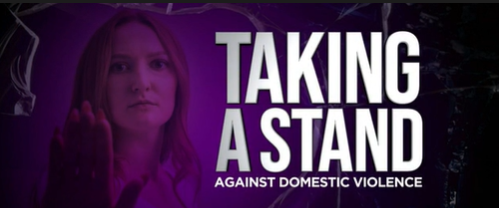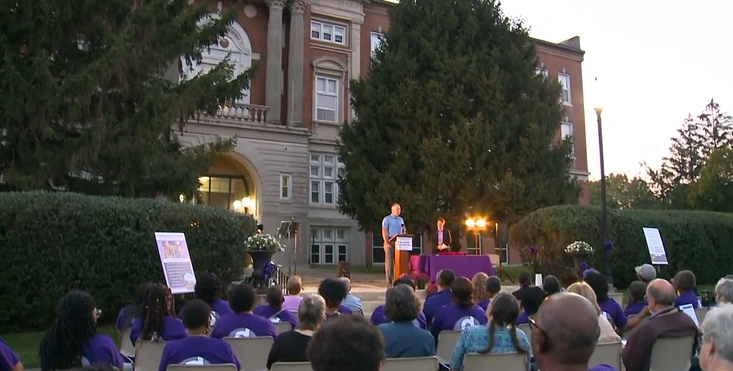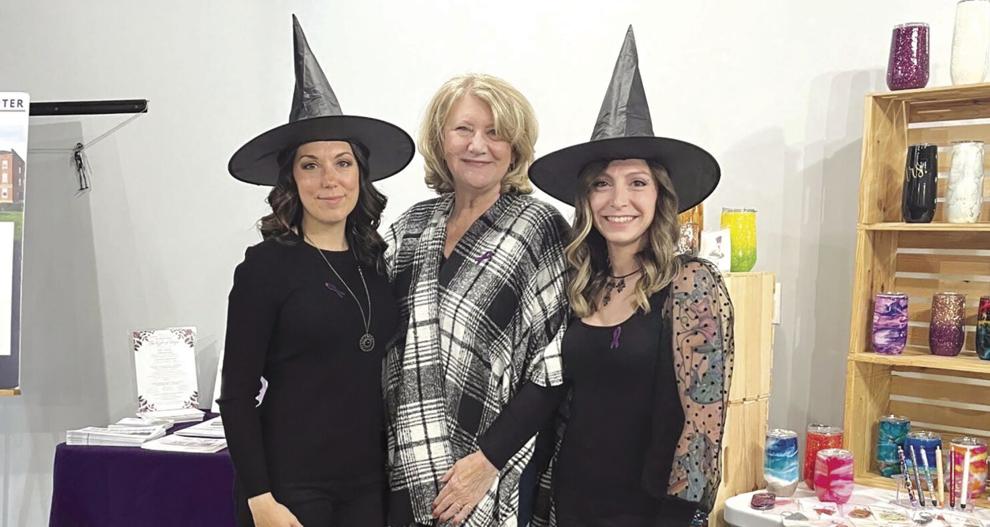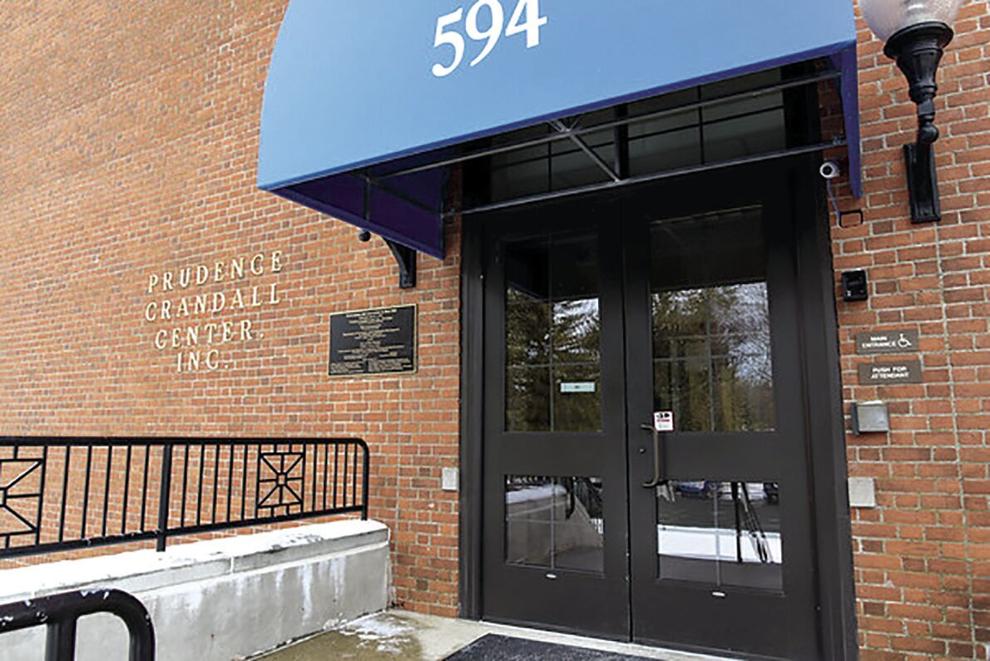
Connecticut domestic violence agency has candlelight vigil
Jayne Chacko; WTNH News 8; Oct. 4, 2023
NEW BRITAIN, Conn. (WTNH) — The Prudence Crandall Center held its annual candlelight vigil on Wednesday night to raise awareness and honor those who have lost their lives in the past year to domestic violence. The center is also commemorating 50 years of serving the community.
Survivors and family members of those who lost loved ones to domestic violence shared their stories. One person said leaving an abusive relationship was just the first step and that the journey is long, and support is needed. “It takes a community to raise a survivor, to sustain a survivor,” one person said.
Davida Foy Crabtree opened the Prudence Crandall Center half a century ago for that reason. She said speaking about domestic violence in the 1970s was taboo. “I had people try to silence me about it and polite people did not talk about these realities,” she said. “We name what’s actually happening, because in that is healing and in that is hope.”
The theme of the vigil was “silent no more.” Sisters Tammy Walker and Taffie Walker-Dudley spoke about their sister, Shenia Walker, who was killed by her ex-boyfriend ten years ago. They said talking about what happened and having a strong support system helped them get through the worst time of their life. “It changed our whole life, our dynamics, everything,” Walker-Dudley said. “My sister was a special person. If you have family and friends who are secure with you and solid with you, you’ll get through it. We got through it, we’re living testimony that you can make it on the other side of tragedy.” Walker-Dudley said the Prudence Crandall Center offered support to their family since its first day. “It’s sad in the beginning, but you will find in joy if you trust in God and you trust in your village,” Walker-Dudley said.
Watch the WTNH News 8 coverage of the vigil here.
Read More

Silent No More candlelight vigil amplifies voices during Domestic Violence Awareness Month
Gaby Molina; FOX61; Oct. 4, 2023
NEW BRITAIN, Conn. — 50 years ago, when Davida Foy Crabtree helped start the Prudence Crandall Center she could have never imagined the crowd of people before her in New Britain on Wednesday. “It’s really a sign of hope and healing,” she said. People spoke out against domestic violence during a month dedicated to bringing awareness to it.
“We know that people who experience domestic violence are living in fear. They’ve been threatened and intimidated and they often feel as if they don’t have a voice. So we are their voice,” said Barbara Damon, president and CEO of the Prudence Crandall Center. The Prudence Crandall Center now offers a wide range of support and resources, including an emergency shelter, counseling and court-based services. “Domestic violence happens to one in four women and one in seven men that’s victims of domestic violence,” Damon said. “In Connecticut, the average is about 14 people every year murdered as a result of domestic violence.”
Shenia Walker of Bristol was one of those people in 2013. “Her smile would light up a room it was everything, was everything,” said her sisters Taffie Walker Dudley and Tammie Walker. They help keep her memory alive for her sons and want to make sure no other family goes through what they did. “People end up losing their lives and loved ones end up losing people they love and it’s devastating,” Tammie said. They share the same belief that talking about the issue can be a light in the darkness. “Most important. It should be spoken about every month,” Tammie said.

Shop for a Cause vendor event in Berlin to raise awareness about domestic violence
Jessica Fontaine; New Britain Herald; Sep. 25, 2023
BERLIN – The Color Platform and Fitness by Design will host the second annual “Shop for a Cause” vendor event to showcase local businesses and entrepreneurs while raising awareness about domestic violence.
The event will take place on Friday from 5-9 p.m. at The Color Platform hair salon, located at 848 Farmington Avenue in Berlin. Proceeds will benefit the Prudence Crandall Center to support its work helping people live freely from domestic violence through care, advocacy, support and education in Berlin and eight surrounding towns in central Connecticut.

Security upgrades for Prudence Crandall Center
Brian Johnson; New Britain Herald; May 14, 2023
NEW BRITAIN – The American Savings Foundation has provided a $165,000 capital grant to the Prudence Crandall Center to fund “critical” security upgrades.
The Prudence Crandall Center, founded in 1973, is the oldest domestic violence prevention program in the state. They serve nearly 9,000 individuals a year with a broad range of services for community members and victims of abuse as well as their children. The capital grant will allow the center to complete a security system upgrade, making the center even safer for those it serves.
Barbara Damon, president and CEO of Prudence Crandall Center, said the installation of a new security system “could not have arrived at a more critical time.” Last fall, a lightning strike damaged some of the system’s components. Even before then, she said, the system was aging and its software was soon to become obsolete. She said this upgrade was “critical to ensuring client and staff safety.”

‘Where We Live’ interviews PCC CEO Barbara Damon, CCADV CEO Meghan Scanlon on critical DV challenges in our state
PCC CEO Barbara Damon & CT Coalition Against Domestic Violence CEO Meghan Scanlon discuss critical challenges we face as government funding for current services is in jeopardy at a time of escalating violence and increased need. Listen to this episode of Where We Live to hear Damon and Scanlon talk about the dire impact of potential funding cutbacks, long term health effects of domestic violence on adults and children, current trends, and how the community can help prevent future violence. Listen to the episode “Domestic violence cases are getting more aggressive, here’s how our state is addressing it” now.
Read More
National Network to End Domestic Violence Statement on Murder of Tyre Nichols
At Prudence Crandall Center, we stand in solidarity with the National Network to End Domestic Violence (NNEDV) in the statement and social media post made by their President & CEO, Deborah J. Vagins regarding the brutal beating of Tyre Nichols, a 29-year-old Black man killed by Memphis police officers earlier this month.
While we truly value and appreciate the partnerships we have with our local police departments, we recognize the need for change within many of our systems.
We would like to highlight and affirm Ms. Vagins’ statement that, “Despite widespread protests and calls for police reform… our country’s system of law enforcement continues to terrorize Black Communities and other Communities of Color. Our work to end domestic violence cannot be separated from police violence and other state-sanctioned violence.” We also recognize the need to follow NNEDV’s lead in “striving to follow the lead of Black advocates and Black-led organizations within and beyond our movement”.
We are committed to racial and social justice and are grateful to learn from others in this movement – a movement to end violence and restore hope.
We urge you to read NNEDV’s full statement here.
Read More
Prudence Crandall Center Celebrates the Impact of Local Leaders
New Britain, CT – With tremendous admiration and appreciation, Prudence Crandall Center (PCC) announces the retirement of Board of Directors member Mary Healey, JD after 18 years of dedicated service to the organization. Healey joined the Board in 2003 and helped lead the agency during a period of expansion and transformative change. Drawing on her commitment to the local community and her extensive professional experience, including 10 years as the Consumer Counsel for the State of CT, Healey consistently delivered intellect, passion, and expertise to the PCC Board.
Taking the helm after the late Tony Garro, Healey dedicated her time and talent as the PCC Board President from 2009-2012. As Board President, Healey set PCC on a path of growth and development, helping to open PCC’s ground-breaking supportive housing programs, which offers victims and their families a safe, stable, and affordable home after seeking shelter. Reflecting on her time on the Board, Healey commented, “My service at PCC has been personally meaningful to me and my family. I’ve been honored to be part of an agency that continues to be a leader in a critically important field where it truly saves and transforms lives.”
Among her many talents, Healey was an incredible relationship builder and fundraiser for PCC. Healey helped shepherd PCC’s successful Bright Futures capital campaign in honor of the agency’s 40th anniversary. A tireless advocate for PCC, Healey forged incredible connections within the local community and built a dedicated base of supporters for the agency. Looking towards the future, Healey expressed her unwavering commitment to the cause and the organization. “I know my family and I will continue to be part of the PCC family, supporting its work. I encourage others to do so as well because this agency has had a tremendous impact over the past 50 years, but there is still much work to be done.”
Current PCC Board President Michelle Rosa remarked, “Never one to shy away from the tough questions, Mary encouraged fellow Board members to lead with their heart and make a positive impact. Mary will truly be missed on the Board, but we appreciate her continued support as a PCC advocate in our community.”
During PCC’s most recent Annual Meeting, Board member and Bristol resident Dave Rackliffe (retired Chief Information Officer for Bristol Hospital) was elected Board Treasurer. Rackliffe brings a wealth of experience to the position and looks forward to leading continued financial growth for the organization. PCC thanks Lucia Chubet (Partner, Mugford & DiBella, LLC) for her dedication and leadership as outgoing Board Treasurer and is grateful for her continued commitment as a Board member engaging our Southington community. Joining the Board this year are three new Board members who bring additional critical talent and expertise to the agency’s Board – Brandy Little (Travelers), Brenda Moore (Bristol Housing Authority), and Mary Smith-Floyd (City of New Britain Community Services).
PCC President & CEO, Barbara Damon, commented, “I am incredibly grateful to Mary and the rest of our Board for their leadership and commitment over the past two years, which were particularly challenging for our community and our agency. Their diversity of skills and experiences, coupled with a passion for our mission, made the impossible possible during the pandemic and enables us to move forward.”
For more information, contact Sarah Hawkes at 860-259-3824 or shawkes@prudencecrandall.org
********************
Prudence Crandall Center was the first domestic violence program in our state and is the only program serving the communities of Bristol, Berlin, Burlington, Kensington, New Britain, Plainville, Plymouth, Southington and Terryville, with 28 units of supportive housing program open to survivors from throughout the state. Services include a 24-hour crisis hotline, emergency shelter, transitional and permanent supportive housing, court advocacy, counseling, and community education and prevention services. For additional information about Prudence Crandall Center or to donate, please visit www.prudencecrandall.org. To access the 24-hour hotline, call toll-free 888-774-2900. All services are free and confidential.
###

CT must do more to help children facing trauma at home
As the COVID-19 pandemic has stretched on longer than any of us originally anticipated, the secondary effects of this global crisis continue to play out in communities and homes around the world, and here in Connecticut.
Much attention has rightfully been paid to the impact of the pandemic on various social and economic fronts including mental health, the education achievement gap, workforce problems and more. However, there is another widespread and dire area of concern that has gotten less attention. A shadow pandemic which plays out within our broader public health crisis that is having a particular impact on Connecticut children: domestic violence.
In the early waves of the pandemic, the very measures put in place to combat the virus were also fueling a “nightmare for victims of domestic violence.” As families were asked to isolate at home, victims of domestic violence were given more exposure to domestic abusers. Early estimates and studies showed more than an 8 percent increase in domestic violence incidents in the United States, as well as a dramatic surge in gun sales. And as the pandemic has dragged on, external factors such as income loss have made domestic situations more volatile, compounding the problem.
The impact is especially acute for children. For one, remote learning meant more time at home, often with adult family members either working from home or experiencing unemployment. Beyond that, the pandemic has caused fewer children to interact with a variety of systems intended to offer safety and support. When children are not in school, it prevents the ability of teachers and other professionals to notice irregularities in behavior that could be attributable to experiencing or witnessing abuse at home; in fact, the Connecticut Department of Children and Families has reported substantially fewer referrals from educators over the past year. Many social services that help children have also been moved to virtual rather than in-person contact, limiting access to some children who otherwise may have had access to those services.
Unfortunately, here in Connecticut there is currently zero state funding for the social service workers whose primary job function is helping children impacted by domestic violence: Connecticut’s child and family advocates. These advocates work at our state’s 18 domestic violence organizations, and utilize a number of trauma-informed, evidence-based and resiliency-driven approaches to their work. They support both children and nonoffending parents with critical services including counseling, coordinating basic needs, school or child care enrollment, scheduling transportation, and advocating for the child and nonoffending parent/survivor within the courts and our child welfare system.
Currently, federal pass-through funds pay for only about a quarter of the cost of a full-time advocate at each domestic violence organization, or $11,500 per position. This results in local providers having to either raise funds privately to fully fund a position or have a staff member split their time across various functions, leaving less time for these child-focused purposes. Looking at the number of cases these advocates handle in Connecticut makes the problem starkly clear: over a five-year period from 2017 to 2021, there was an average of 4,313 children served annually by advocates. However, given that each member receives funding for a maximum of 26 percent of their time, that means that federal funding is only supporting advocates for 2.26 hours of service to each child, per year.
Thankfully, state leaders are recognizing that this isn’t a sustainable situation for Connecticut, or its children. Lt. Gov. Susan Bysiewicz recently made a strong and clear call for state action to fund these positions, and to do it this year. Along with the lieutenant governor and key partners in the General Assembly, the Connecticut Coalition Against Domestic Violence will seek a total of $1,440,000 in new state funding to cover the cost of 18 full-time child and family advocates. This number is less than .01 percent of Connecticut’s state budget, but it would be a lifeline to thousands of children who experience or witness violence in their homes, including those who have experienced increased exposure during the pandemic.
Providing evidence- and strengths-based resiliency services for children is paramount to the overall safety and stability of Connecticut families, but currently there is simply not a sustainable way to meet those needs. Connecticut can and should do more — it should start with fully funding child and family advocates.
Meghan Scanlon is the president and CEO of the Connecticut Coalition Against Domestic Violence.

Barnes Memorial Trust Awards Grants In Southington
SOUTHINGTON, CT — The Main Street Community Foundation recently awarded a total of $474,258 in grants from the Bradley Henry Barnes & Leila Upson Barnes Memorial Trust to 13 nonprofit organizations “working to support the health and well-being of Southington residents.”
The grants awarded are:
- The Arc of Southington – $5,900 – Repair and rebuild the handicap accessible ramp and landing at the entrance to the main office building
- Bread For Life – $78,000 – Meal program for Southington’s food-insecure population, including support for rising food-related costs
- Early Childhood Collaborative of Southington – $27,500 – Health, safety and well-being educational programs for young children and their caregivers.
- Friends of Southington Community Services – $30,000 – Food, fuel assistance and other basic needs for low-income residents
- LiveWell Alliance, Inc. – $55,000 – “Empowering Partnership Network” as well as the development of programs for people living with dementia through the Center for Resilient Living
- Prudence Crandall Center Inc. – $45,000 – COVID-19 recovery relief and services for Southington victims of domestic violence and their children
- Southington-Cheshire Community YMCAs – $100,000 – COVID-19 recovery relief support of programs and operations
- Southington-Cheshire Community YMCAs – $31,434 – Community collaboration with the YMCA, Southington Public Schools and Southington Police Department to purchase and install “Stop the Bleed” kits in public locations
- Southington Community Cultural Arts – $50,000 –All Access program for adults with disabilities and those living with dementia
- Southington Education Foundation – $15,000 – Materials, supplies and licenses to enhance the “RULER” initiative for social/emotional learning in the Southington public schools
- Southington Manna Fund, Inc. – $5,000 – Emergency housing for temporarily displaced Southington residents
- United Way of Southington – $28,424 –Senior Transportation Services program, which offers free rides to Southington seniors to medical appointments, pharmacy, banks and care facilities
An additional $3,000 was provided to long-term care facilities – LiveWell Alliance and Southington Care Center – for patient assistance funds for financially disadvantaged residents.

